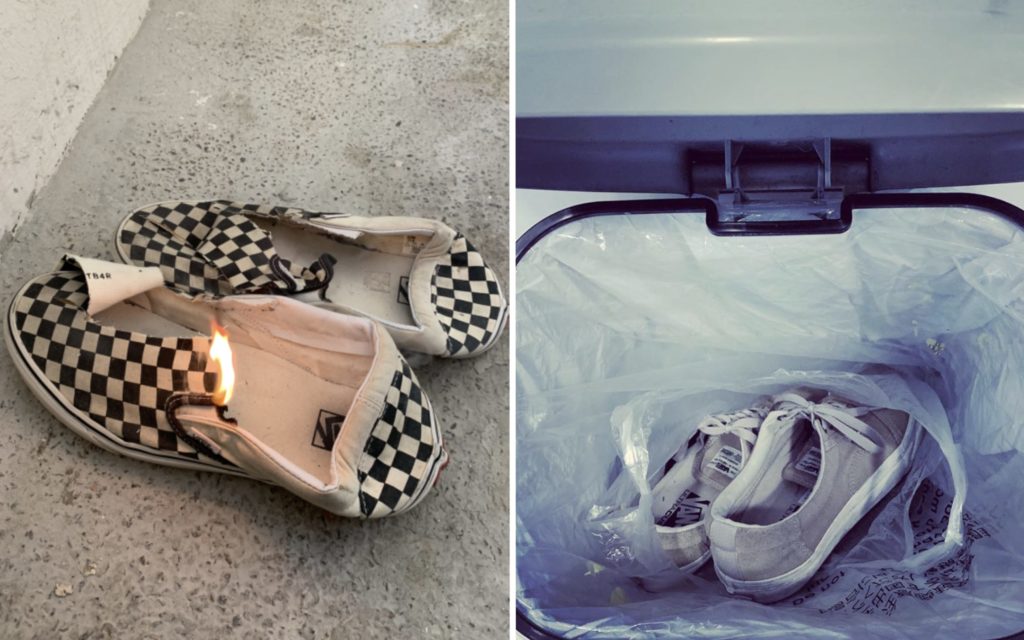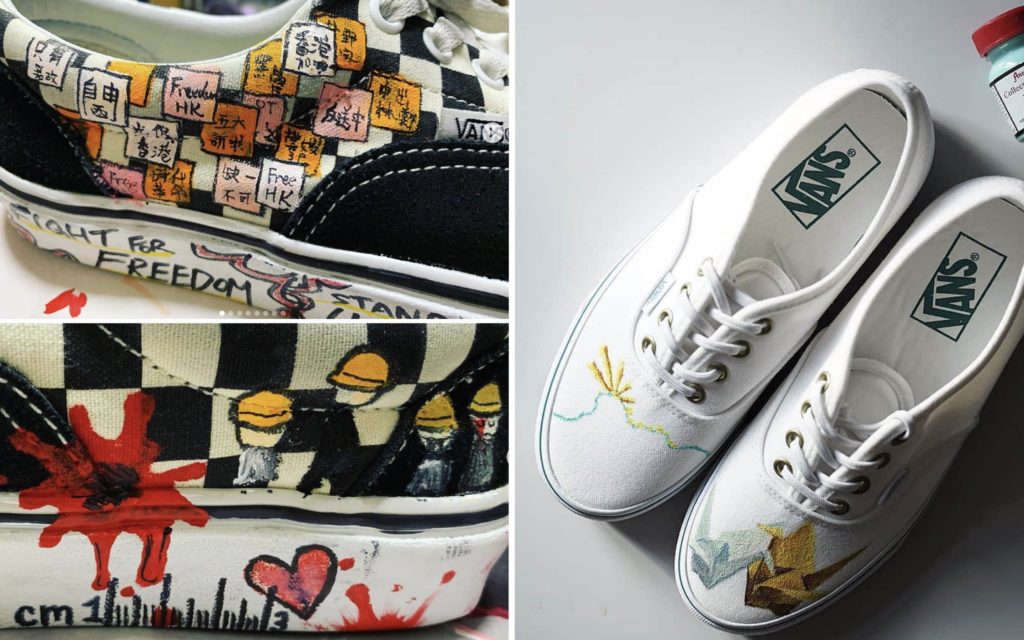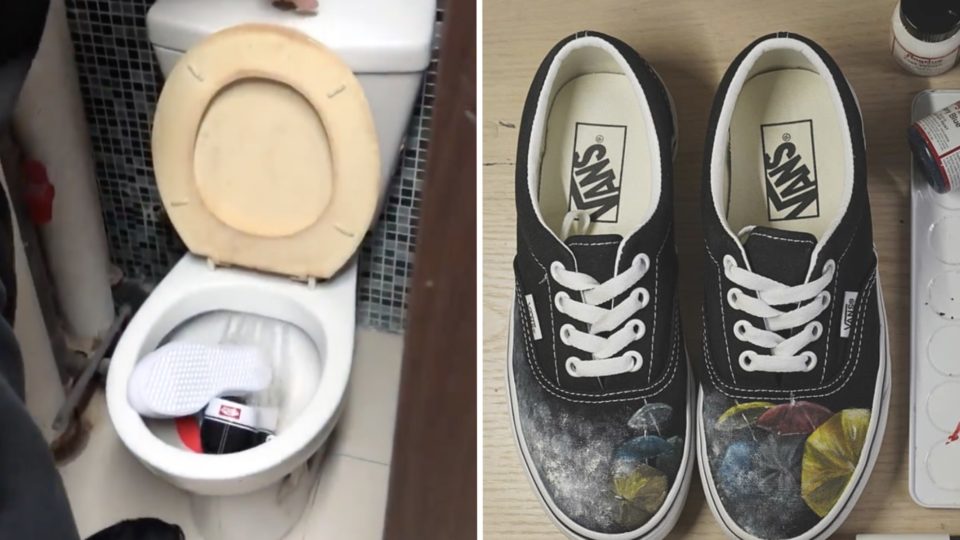Hongkongers took to social media over the weekend to show themselves dumping, torching, and even flushing Vans sneakers after the skateboarding apparel company removed a shoe alluding to the city’s anti-government protests from a design competition.
The backlash to the decision to withdraw the custom shoe, which featured images of protesters wearing yellow helmets, prompted a hasty (and vague) defense from the brand, and was just the latest in a recent spate of incidents of companies appearing to bend over backwards to avoid offending the lucrative mainland market’s delicate nationalist sensitivities.
The Vans furor centered on the company’s shoe designing competition Custom Culture, in which participants submit custom designs for sneakers and members of the public vote on their favorites. A final winner is chosen from the top 10 vote-earners, with the winning designer taking home a US$25,000 prize and Vans putting the winning design into production.
When voting commenced on Oct. 1, an entry by Canada-based artist “Naomiso” featuring images of Hong Kong protesters sporting their signature yellow helmets, face masks, and goggles skyrocketed to the top of the heap.
According to trade publication Business Of Fashion, Naomiso’s design drew more than 140,000 votes — making it far and away the most popular design by a factor of nearly 14 — before it was quietly pulled from the website over the weekend without explanation.
In a bid to quell the resulting outcry, Vans released a statement on Facebook on Saturday afternoon saying: “As a brand that is open to everyone, we have never taken a political position and therefore review designs to ensure they are in line with our company’s long-held values of respect and tolerance, as well as with our clearly communicated guidelines for this competition.”
Someone has uploaded a other design #HongKongProtests #hongkong https://t.co/8yNTSkVQ1X pic.twitter.com/DUGNEmMBMG
— Vicky Wong 黃瑋殷 (@vickywong710) October 5, 2019
The company said that they had rejected a small number of submissions in order to “uphold the purpose of Custom Culture,” but did not elaborate on why Naomiso’s design was removed.
It also hasn’t helped that shortly after Naomiso’s design was removed, another protest-themed entry — this one by a user called “Lock.E” from the UK — also mysteriously vanished from the site during the furor.
Social media users were quick to express their discontent, posting photos of themselves throwing out their shoes with captions like “trash shoes, never buying again,” “shame on Vans,” and “Vans on the Great Wall” — a play on the company’s slogan, “Vans off the wall.”
There was even talk on the Reddit-like forum LIHKG of reprising the online protest IRL, with some calls ciruclating for protesters to target Vans outlets in Hong Kong.
One local chain of sneaker stores called Dahood announced on Facebook on Saturday that they were suspending operations at three of their Vans outlets because of the controversy.

While some merely destroyed their Vans, others took a more creative approach, coming up with their own custom Vans designs celebrating Hong Kong’s pro-democracy protesters.
One user called Feijaisketches — who usually paints pet portraits — offered two repainted versions of the sneakers, including one featuring umbrellas and tear gas, and another featuring origami cranes and Hong Kong’s Lion Rock, with laser pointers beaming from its peak.
Others adorned the shoes with yellow-helmeted protesters, slogans like “fight for freedom, stand with Hong Kong,” and even a picture of a ruler marking three centimeters next to a heart — a reference to the teenager who was shot in the chest by a police officer during National Day protests. It was the first time a protester was injured by live ammunition, and the bullet reportedly lodged just three centimeters from high school student’s heart.

According to the competition rules, designs can be removed if they feature either trademarked or copyrighted material, business or brand logos, images of celebrities, professionals, sports team logos or mascots, nudity, images of weapons or violence, offensive content, obscenity or hate, or images referencing drugs, alcohol, or smoking. The guidelines also say that Vans “reserves the right to reject any image.”
Vans wasn’t not the only company to learn a tough lesson in recent days about China’s tender feelings.
The NBA’s Houston Rockets found themselves caught up in the Hong Kong protest storm after the team’s general manager, Daryl Morey, tweeted his support for the Hong Kong protests — sparking a backlash on the mainland and what many characterized as a grovelling apology from the league to its many “friends and fans in China.”
Stateside, the statement was met with such scorn from all political corners that the league was again forced to clarify its stance, with Commissioner Adam Silver insisting to reporters that there were “values that have been part of this league from its earliest days, and that includes free expression.”
Similarly, jewellery retailer Tiffany & Co. also scrambled to delete a tweet featuring a model covering her right eye — a pose some users thought was a reference to a female first aid volunteer shot in the right eye with a bean bag round during a protest in August.
The volunteer went on to become an emblem of the protests, with many demonstrators covering their eye in a gesture of support.
https://twitter.com/rhokilpatrick/status/1181165701991563265
Meanwhile, South Park — the long-standing American bastion of gleeful shit-stirring — offered a different model for dealing with China’s hair trigger for outrage, releasing an episode poking fun at Western companies’ (specifically Hollywood’s) predilection for studiously avoiding giving offense to China in order to continue enjoying access to its enormous market.
According to the Hollywood Reporter, the episode prompted China’s censors to yank the show from the country’s streaming outlets, and to even remove past mentions of it from the Twitter-like platform Weibo.
You gotta lower your ideals of freedom if you wanna suck on the warm teat of China. #southpark23
Watch "Band in China": https://t.co/GQEQL9ynCs pic.twitter.com/RepekgO3j9
— South Park (@SouthPark) October 7, 2019
Rather than tuck their tail between their legs and offer up a Mandarin mea culpa, à la the NBA, the show’s creators, Trey Parker and Matt Stone issued a mocking “apology” further ridiculing the PRC and the obsequious brands that do business there.
“Like the NBA, we welcome the Chinese censors into our homes and into our hearts. We too love money more than freedom and democracy. Xi doesn’t look just like Winnie the Pooh at all. Tune into our 300th episode this Wednesday at 10! Long live the Great Communist Party of China! May this autumn’s sorghum harvest be bountiful!” the tweet read, before asking, with all the faux humility of Eric Cartman: “We good now China?”
Back in Hong Kong, as protests continue into their fourth month, demonstrators have taken to expressing their disapproval towards mainland-linked companies and brands in much more physical ways, vandalizing outlets of the Bank of China, Xiaomi, and even Starbucks, after the daughter of the founder of its license-holder in Hong Kong, the catering group Maxim’s, denounced the protest movement during an appearance at the UN.




